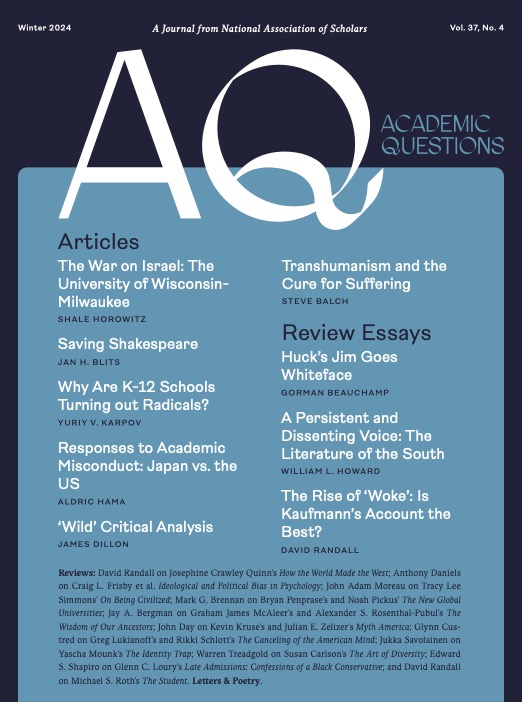Ideological and Political Bias in Psychology: Nature, Scope, and Solutions, Craig L. Frisby, Rochard E. Redding, William T. O’Donohue, Scott O. Lilienfeld, eds., 2023, Springer, pp. 970, $119 hardcover.
Created half to rise, and half to fall;
Great lord of all things, yet a prey to all,
Sole judge of truth, in endless error hurl’d;
The glory, jest and riddle of the world!
Alexander Pope, An Essay on Man
It is nearly three centuries since Pope wrote his Essay, but our fundamental existential position has not changed very much in the intervening years. Certainly, there has been no more brilliant or succinct summary of it than Pope’s: we are still a mystery or riddle to ourselves, all claims to the contrary notwithstanding. Personally, I hope that we may remain so.
True, many sources of misery have been reduced or eliminated, including the malady (Pott’s disease, or tuberculosis of the spine) that caused Pope to describe his sojourn on earth as “This long disease, my life”—which was the plain unvarnished truth and not an outburst of self-pity. We now practically all enjoy comforts that would have made Louis XIV gasp with envy, and yet we do not bask in satisfaction. Somehow, we always find way to make ourselves (and others) miserable: for Man is as much a problem-creating animal as a problem-solving one.
It is not surprising, then, that the study of psychology has contributed very little to human happiness in the century and a half of its existence as a study in itself, and may even have exacerbated unhappiness, first by teaching people to examine their mental state with the same obsessive attention that a hypochondriac pays to his pulse or the product of his bowels, and second by holding out false hopes of a total solution to life’s little problems. There is no indication that the more we study psychology, the better we know how to live, or practice living; if anything, the reverse is the case, and that the study of psychology is what psychoanalysis was to the Viennese satirist, Karl Kraus, namely the disease it pretends to cure. To train more psychologists to render us happy is like training more lawyers to defeat crime.
If the promise held out by psychology has proved delusive, and its repeated claims to explain or understand the whole of human conduct to have been grossly exaggerated, it is not to be expected that so vast an enterprise by so many clever people has yielded nothing of value in its results. Behaviorism, for example, might have been absurd in its intellectual overreach, but ultimately it resulted in practical techniques to assist humans in certain psychological difficulties.
It is just that, by comparison with the scale of the efforts, the rewards have been meagre. It is said that the present generation of children and adolescents is the most miserable in a hundred years, despite—or is it because of?—the veritable army of psychologists and psychologizing professions that attends to its welfare. Supposed knowledge of addiction has been accompanied by an unprecedented number of deaths caused by—drugs of addiction. Psychology therefore resembles a dog that is constantly chasing its tail.
Nevertheless, it is one of the most popular subjects of study at the undergraduate level: I have read statistics putting it anything from first to fifth (in the book under review it is third). This in itself is interesting but not necessarily reassuring: is it a sign of intellectual curiosity about the human condition or of mass self-absorption and even narcissism? Most of the young people to whom I have spoken who were contemplating the study of psychology wanted to find out about themselves more than they wanted to find out about others. Alas, they desired to find rather than to lose themselves.
Considering that there are scores or even hundreds of thousands of young people studying psychology, it is a matter of some social importance to know what they are being taught. They are, after all, the priestly class of the future, and if they are having their minds corrupted by ideology rather than being genuinely educated so as to be able to think critically, the consequences for society might be unfortunate. Preening themselves, and often being accepted, as experts, they will propose all kinds of false or hazardous nostrums that will waste time, effort and resources, and lead to unnecessary conflict. No drunk in a bar is nearly as dangerous as a misguided expert.
It is the burden of this very large and unwieldy multi-author book that psychology as an academic discipline and practical profession has been hijacked by an almost monolithic ideology, which for shorthand I will call Woke. It presents evidence, almost ad nauseam, that the great majority of the keepers of psychology’s flame are so strongly possessed of a certain mindset that they cannot conceive of any other, unless it be held for malign, reactionary, and racist reasons. The keepers of the flame decide what is researched, what is published, and who advances up the career ladder. They are now a self-replicating elite, that regards dissension as a kind of harmful mutation in its DNA which if not bred out will lead to the weakening of the species, rather than a necessary and healthful challenge from within to improve the chances of survival.
It cannot be said that this volume is a joy to read, but it was almost certainly not intended to be read, as I read it, from cover to cover. Physically, it is an unwieldy object: I was tempted to imitate Thomas Babbington Macaulay’s review of Dr. Nares’ vast biography of Lord Burleigh by giving first its weight and then its other physical dimensions. There is a good deal of repetition in it, some bad writing, and often a marked lack of concision. It could, and should, have been many pages shorter. It was, moreover, hardly to be expected that all chapters would be of equal merit; and I prefer to dwell on the better chapters or on the more interesting ideas, whether right or wrong.
Abundant credible evidence is presented that psychologists, both academic and practicing, are overwhelmingly, and increasingly, on the left, at least in their opinions if not in their personal economic arrangements. But why should this matter? After all, if we were to discover that oncologists, say, or astrophysicists, were overwhelming of one or other political tendency, it would hardly worry us. Oncologists, for example, have a professional ethic strong enough that we are confident that their political views are completely irrelevant to their practice. We trust them to do their best according to the latest lights of their discipline; we would not ask them how they voted.
Psychology is evidently not quite in the same category of endeavour, then, as oncology, because it is clear that psychologists do consider political standpoint relevant to their practice. At various times in the book we are told that quite a high percentage of psychology professors would allow a candidate’s political or religious views to affect their decision as to whether to hire him, and would be prepared to discriminate against a conservative or Christian candidate. Of course, saying what you would be prepared to do is not the same as saying what you actually have done or will do; many of us say that we are prepared to do things that we never do.
Oddly enough, the conditional mood of the willingness to discriminate in this way is never replaced by the indicative, so we are left wondering whether such conscious discrimination ever takes place, or whether the predominance of left-wing opinion in psychology departments is simply a spontaneous flocking together of birds of a feather.
Most likely it is not; but in any case, postulants for positions in most psychology departments are asked to declare what they will do or already have done to further the Diversity, Equity and Inclusion agenda. Confronted by this ideological Gleichschaltung, a conservative candidate is faced by a dilemma: either he lies, in which case his probity is destroyed, or he refuses to participate in this process, in which case he will have to abandon his academic ambitions.
Again, one might wonder about a selection process for academic positions in which it is even possible or considered relevant to know what a candidate’s religion is (it is not possible to infer even from a Muslim name that a person is a practicing Muslim). When I look back on my own education, I gratefully acknowledge that I did not know the political or religious opinions of a single one of my teachers, who would have regarded it as highly unethical, a betrayal of their trust, to obtrude them into their teaching. That singularly fortunate cultural moment has passed: children as young as five are now being indoctrinated into orthodoxies from which dissent is almost impossible because unthinkable, or if not unthinkable, dangerous.
There is no reflection in the book, as there ought to have been, on the implications for the very nature of psychological science of the relevance of ideological and political bias in it. What counts as science when the object of that science changes with time, place, and culture? The past is another country where they not only do things differently but think and feel things differently: and the future will be a different country too. On such shifting sands, is the construction of any true science or solid body of knowledge possible, or is the whole enterprise misconceived from the first?
Certainly, the epistemology of modern psychology as it is taught seems to have some connection, however inchoate, with Marxism. “It is not the consciousness of men that determines their being,” wrote Marx in A Contribution to the Critique of Political Economy, “but, on the contrary their social being that determines their consciousness.” Marx, of course, thought that it was economic structure and class interest that was in turn the determinant of social being and therefore of consciousness; but many psychologists put race and sex as the highest determinants.
As a rough sociological and psychological generalization, Marx’s dictum is true, though uninteresting since so obvious. Most people think like the people around them think. But as an iron law of the theory of knowledge it is interesting, though obviously false, as Marx’s own life attests; and people who think differently from others often have a profound effect, for good or evil, on their societies.
As the authors in this book argue, groupthink and ideological conformity exert a disastrous effect on psychology as a study and practice. They discourage or prevent alternative explanations of phenomena, which may be superior to the accepted ones; they lead to a refusal to investigate many important subjects, such as the possible accuracy of, or grain of truth in, social stereotypes; they may even conjure entities such as implicit bias and micro-aggressions, of doubtful existence or significance, from the air and then create whole industries supposedly to eliminate them (though no one really wants to kill the goose that lays the golden egg).
The way in which false, ideologically-inspired theories can lead to harmful practices is cogently explained in a chapter by Drs. Redding and Satel. If a therapist is convinced that all the woes of persons belonging to an ethnic minority arise from discrimination against and maltreatment of that minority, his or her position as an expert can easily convince a patient from that minority that this is so, and thereby set that person on a path to lifelong counterproductive resentment, seeking salvation where it will never be found. Ideologies that conceive of people as the bearers of grievances ex officio are actually very demeaning, an assault on their individuality—with which the therapist is, or ought to be, solely concerned qua therapist.
The doctrine of multiculturalism, according to which all cultures are equal except Western culture, which is the only one capable of evil, stands in the way of true understanding. All doctors of any competence soon learn to take the social situation and cultural beliefs of their patients into account, and this may result in certain surprises. I soon discovered, for example, that the last person a young Muslim woman with personal problems wanted to confide in was a Muslim doctor, for they believed, rightly or wrongly I cannot say, that the Muslim doctor would not keep confidences because he or she would believe in a duty, that to the “community,” higher than that to his or her patients; and furthermore that I discovered that I was capable of understanding their often tragic situation, one that was alien to me, in which what they wanted for themselves was at complete variance from what their parents, whom they loved and who were in many respects good parents, wanted for them—this leading sometimes to the most appalling outcomes. But easy orthodoxies would inhibit thought about such problems.
Persecution of the unorthodox occurs in the psychological academy. Bruce Rind was the author of a paper that suggested that the consequences of child sexual abuse were much less dire than previously supposed. No doubt there were problems with his paper, which was, unprecedentedly, the object of almost unanimous condemnation by the U.S. Congress. He lost his position at Temple University and never got another tenure-track job. The question is not whether he was right: he was probably right in part and wrong in part. The question is whether a serious researcher should have his career ruined because he has, in good faith, challenged an orthodoxy, or perhaps because he was in danger of snatching a favorite toy from psychology’s perambulator.
One of the more surprising chapters is that by Heiner Rindermann, on the advantages of holding a minority viewpoint in a politicized psychology profession. Being in the minority encourages refinement of arguments, the gathering of better statistics, the refinement of hypotheses: for the person in the minority has to be better than his orthodox opponents and cannot afford to become complacent. Since truth, like murder, will out, some enforcement of an orthodoxy may actually conduce to progress, though of course the precise degree of beneficial enforcement of that orthodoxy cannot be estimated and can easily go far too far. Is it possible that prejudice against groups, provided it is limited either by law or custom, actually works to benefit those groups, at least from the point of view of their success?
Of the 960 pages of the book, a mere fifty are devoted to possible solutions to a situation in which the only form of diversity that is not encouraged in universities is the only form that has any meaning or value in the context, namely intellectual diversity. Drs. Clark and Tetlock’s plea for what they call adversarial collaboration, seems eminently sensible. They would like researchers of different or opposing views to frame hypotheses and experiments, with protocols that cannot be changed, that they think will provide evidence for or against their views. Among other benefits, this would lower the ideological temperature, which at the moment is extremely high, and which is not conducive to the disinterested search for truth. People who disagree would come to realize that there are reasons for disagreement other than the moral defect of those who disagree with them.
The only slight problem with this proposal is that the academy has become so ideologically uniform that adversaries might be difficult to come by.
The last chapter in the book strikes me as disastrous. It is by Dr. Redding, whom I have previously praised. His solution to the problem of bias in academic psychology is a system of positive discrimination in favor of conservatives. He uses the very language of woke opponents in describing the microaggressions and implicit bias to which conservatives are subject. He would, in effect, set up a counter-bureaucracy to the DEI bureaucracy, equal and opposite to it, which seems to me about the very worst thing that could be done.
There are many other interesting chapters in this book which I have not the space to discuss: for example, the finding (in which Dr. Redding was a collaborator!) that a liberal professoriate does not have much effect on making undergraduates more liberal than they already are—which I have to admit is not what I expected. Thus, the effect on society of institutionally leftist psychology, if any, will work through the professoriate rather than though its products, if I may use such a word in connection with human beings.
I have been somewhat critical of this book, it is partly because I have read it in a way that I presume no one else will. Everyone will find stimulation in it by picking out the chapters whose subject most interests him.
Anthony Daniels is a contributing editor to City Journal and Dietrich Weismann Fellow at the Manhattan Institute; [email protected]. He last appeared in AQ with “Economic Development: The Dismal Science,” in our spring 2021 issue.
Photo by Jorm Sangsorm on Adobe Stock














